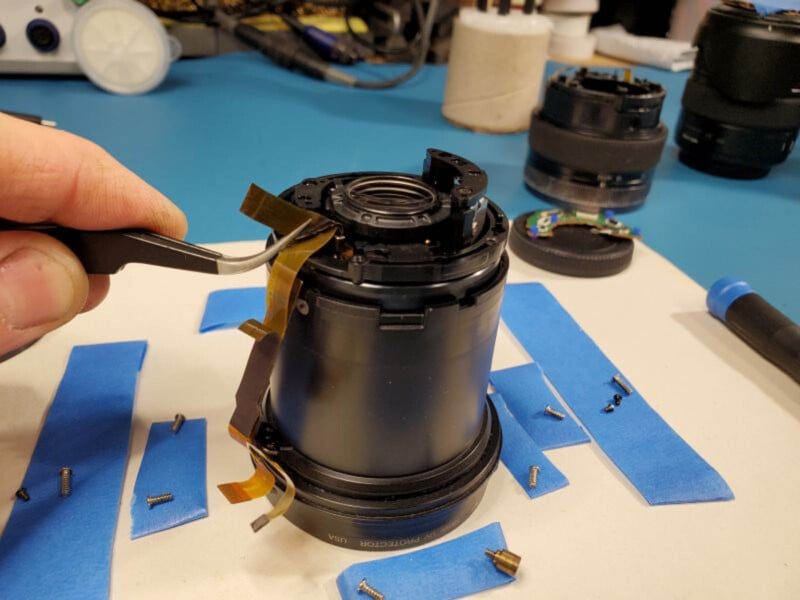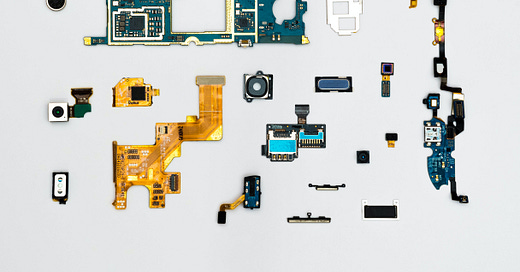Apple Calls for National Repair Law
The world's largest phone manufacturer calls for national repair law after California forced their hand. Also: Will the PS5 Slim's activation requirements shorten its lifespan?
Apple announced this week at a White House convening on right to repair that they will be actively supporting the passage of a nationwide right-to-repair law. Citing the recently inked right to repair law in California, a representative for the company promised that the company would be extending the services now required by the Golden State all across the United States.
Vice President of Apple (and only speaker to wear AirPods) Brian Naumann gave the announcement, and if you read between the lines you can learn a lot more about how the company will be approaching right to repair in the future.
“We intend to honor California's new repair provisions across the United States. Apple also believes that consumers and businesses would benefit from a national law that balances repairability with product integrity, usability and physical safety. We believe that a uniform central repair law should do the following: maintain privacy, data, and device security features which help to thwart theft, ensure transparency for consumers about the type of parts used in a repair.”
Apple is playing the long game
It’s clear the company has shifted its stance because it knows there is no getting the genie back in the bottle. Right to repair has been codified into multiple state-level laws that impact tens of millions of people. As a savvy multinational corporation with fleets of lobbyists that have been effective in shaping policy in the past, they are poised to influence the national law they are now calling for. It’s clear that the company intends to be a player in shaping a national right to repair law in Congress rather than waiting around for other states to add more complications to their business operations. And as the first major corporation to come out in support of a national repair law, they can decide what will be included and what might be excluded.
This comes at the same time that 404 Media is reporting that the tech industry is exploring the idea of creating a "Memorandum of Understanding" (MOU), similar to agreements in other industries like automotive and agriculture, as a way to manage right to repair legislation’s scope. These MOUs act as voluntary agreements between manufacturers, aiming to standardize repair practices and avoid the complexities of complying with different state laws. This is another potential way tech companies could get ahead of legislation by setting the terms of their MOU to create a framework for lawmakers to latch onto.
Even with explicit support of a right to repair, which can mean different things to different actors, there are dog whistles that worth mentioning. Naumann strongly emphasized talking points about safety and privacy, possibly indicating that the company would use these arguments in putting boundaries on any national legislation. These overtures to safety and privacy can feel disingenuous, especially because Apple has opposed stricter data privacy laws in the past while simultaneously invoking consumer privacy. Naumann also spoke to the need for product durability, citing Apple’s new Titanium phones as yet another example of how the company is pro durability and pro repair while making no mention of planned obsolescence through software or the company’s use of part pairing.
This announcement also comes days before Apple’s Keynote Address on October 30th, which spent a large portion of its last major announcement on sustainability, so there could be a mention of repair in this upcoming keynote. But amidst battles for Speaker of the House and international crises aplenty, it will be surprising if Apple’s call for right to repair materialize into a bill in Congress.
Other News
A new California privacy law, known as the Delete Act, has gone into effect, allowing individuals to opt out of data brokers selling their personal information through a single website, with full implementation expected by 2026. This comes at the same time California passed its right to repair law, becoming the third state in the U.S. to pass this legislation.
The upcoming PlayStation 5 Slim disc drive installation will require an internet connection, raising concerns for independent repair shops as well as game preservation generally, potentially creating obstacles in the future when relying on Sony's authentication servers for legacy game play.
In this hands-on camera lens repair journey, a fixer encounter the frustrations and roadblocks plaguing the world of DIY camera maintenance. Attempting to mend a malfunctioning lens, we delve into the intricate process of dissecting and rectifying the damage. Notably, we unravel the profound lack of available replacement parts for camera repair, particularly those elusive flex cables. In the age of digital photography, we grapple with the scarcity of service manuals and the barriers they pose to independent repair enthusiasts. But our authore notes a silver lining with burgeoning right-to-repair legislation, such as New York's Digital Fair Repair Act, paving the way for more accessible repair information.

Recycling electronics can benefit small business by potentially offering money back for old devices, providing resources for manufacturers, reducing harmful waste and pollution, and offering the opportunity to donate still-usable electronics to charitable organizations.
The movement for the right to repair is growing in New Zealand, as the country grapples with limited recycling of electronic waste and devices with deliberately short product lifespans. Professor in commercial law at the University of Auckland discusses the lack of laws ensuring the right to repair, which includes designs that make products last longer, the availability of spare parts and repair information, and the right to use commonly available tools, contributing to our collective e-waste problem.
Recycling rates in Scotland have stagnated, with politicians facing accusations of "continued failure" as figures show that recycling rates have risen only slightly since the previous year, and Scotland remains far from achieving its recycling targets, including a proposed landfill ban and a 70% recycling target by 2025, with concerns raised about increased incineration of waste, as revealed by statistics from the Scottish Environmental Protection Agency.

Extended Producer Responsibility (EPR) laws for packaging are now in effect in four U.S. states (Maine, California, Oregon, and Colorado), and more states are considering similar legislation.




